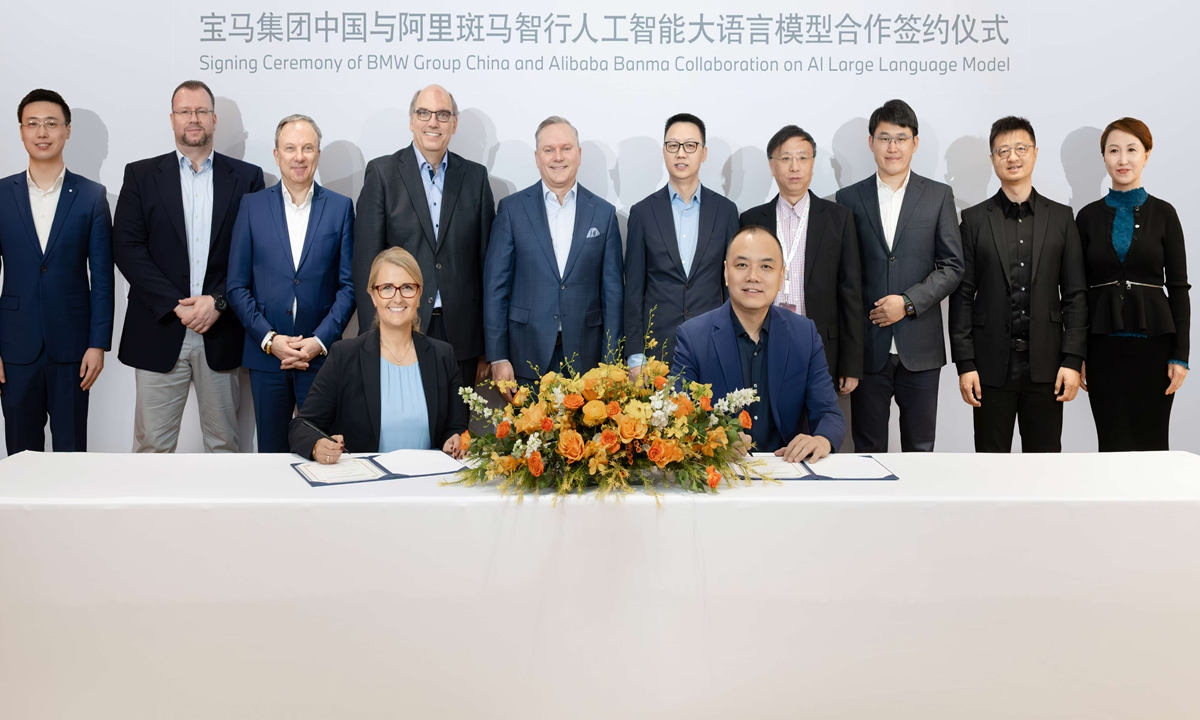(Source:Global Times,2025-03-26)

A signing ceremony between BMW Group China and Alibaba Banma to deepen their strategic partnership is held in Beijing on March 26, 2025. Photo: Courtesy of BMW Group China
BMW and Alibaba announced an expanded partnership in China on Wednesday to integrate large language AI model (LLM) into the next generation of BMW vehicles, a step forward in AI-driven mobility.
A Chinese expert called the move a positive signal of China-Europe business cooperation, showing complementary advantages of both sides in the industrial field.
The AI engine will be based on Yan AI, a Qwen-powered smart cockpit solution developed by Banma, Alibaba's in-car tech subsidiary. The AI-enhanced Intelligent Personal Assistant will debut in BMW Neue Klasse models produced in China starting from 2026.
For Alibaba, the partnership exemplifies a mission to drive industrial transformation through AI, empowering global manufacturing leaders like BMW with Qwen's advanced capabilities. This initiative underscores BMW's commitment to embedding AI across its R&D and product development, following the launch of its AI strategy in China.
It is a positive signal of cooperation between Chinese and European enterprises and reflects the complementary advantages of both sides in the industrial field, Jian Junbo, director of the Center for China-Europe Relations at Fudan University's Institute of International Studies, told the Global Times on Wednesday.
In his view, Alibaba has advantages in AI innovation, and BMW needs intelligent technology to keep up with the development trend of the industry. This type of cooperation highlights the potential for openness, mutual benefit, and win-win outcomes between Chinese and European firms, Jian said.
The partnership follows the recently concluded China Development Forum in Beijing. The forum has attracted more than 750 foreign representatives, including 118 official representatives and 86 business representatives. A record number of first-time participants from multinational companies across diverse countries attended.
Executives from several multinationals told the Global Times that Chinese market remains a key pillar of their global strategies, where they plan to increase investment.
The Chinese market is a main pillar of our global strategy, and a key driver of our electric and digital transformation. Mercedes-Benz remains committed to long-term investment in China. I believe that China's policy to further open up would significantly contribute to unlocking China's full potential, said Ola Källenius, Chairman of the Board of Management of Mercedes-Benz Group AG, at the speech of CDF on Sunday.
When meeting with Källenius on Friday, China's commerce minister Wang Wentao said both China and the EU are advocates of multilateralism and free trade, and should work to build consensus, strengthen cooperation, and clearly oppose unilateralism and protectionism.
A Chinese expert noted that the stability and steady growth of China's market continues to attract foreign investment, and enterprise-level cooperation aligns with China's goal of promoting high-level opening-up.
As China accelerates innovation in areas like AI, China's industrial advantages will become more and more obvious. China's stable economic growth and huge market potential remain important attractions for foreign companies, Jian noted.
At the two sessions held in early March, the Chinese government reaffirmed its commitment to high-standard opening-up and stabilizing foreign trade and investment.
Since its debut in April 2023, Alibaba's Qwen has been adopted by over 290,000 enterprises across industries, from automotive, manufacturing, and finance to gaming, healthcare, and robotics. Accessible via Alibaba Cloud's generative AI development platform Model Studio, Qwen has been embraced by global businesses and developers for AI innovation, Alibaba said.






